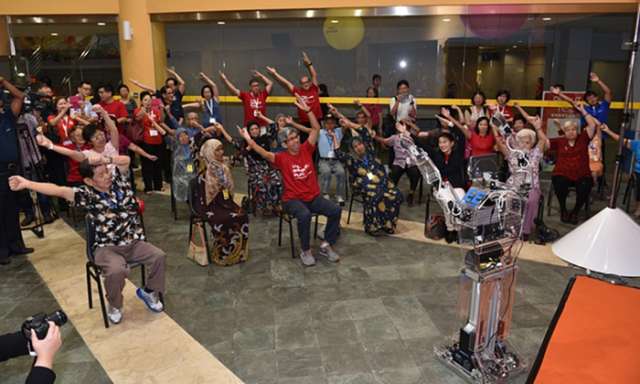The android with metal arms and a screen for a face is already leading sessions and will roll out its services to five “senior activity centres” across the city-state this year, according to Infocomm Development Authority of Singapore (IDA), a government body that supports the country’s tech industry.
“It has been effective in engaging seniors to do their exercise routines correctly with its motion-sensor technology,” the IDA told the Guardian.
“Feedback has been positive as seniors enjoy a novel way in physical exercises,” it said, although interaction with human volunteers is “just as important”.
Unlike the fictional superhuman cyborg Robocop from the 1987 film, whose primary directive is to fight crime with lethal force, Robocoach is part of a project that “aims to bridge the digital divide among seniors aged 50 and above”.
The IDA hopes to review the project over time, implementing more Robocoaches if it proves a successful trainer. The robot is already working at Singapore’s Lions Befrienders senior activity centre.
Singapore’s Ngee Ann polytechnic developed Robocoach and says “she” has a rosy red face, blue eyes and two teeth, and mimics human movements.
The robot “takes her responsibilities very seriously and coaches the elderly in performing 15 types of arm exercises each week. She can recognise the human voice instructing her to start off the exercise routine,” a report on Ngee Ann’s website says.
“She slows down the pace during group workouts to make sure everyone can catch up.”
Singapore has the world’s third most rapidly ageing population, according to the IMF.
Japan, which has the fastest ageing population, is leading in the field of robotics and the country’s Riken institute this year announced Robobear, a cartoon-faced android that can help lift a people from a bed into a wheelchair.
“With its rapidly increasing elderly population, Japan faces an urgent need for new approaches to assist care-giving personnel. One of the most strenuous tasks for such personnel, carried out an average of 40 times every day, is that of lifting a patient from a bed into a wheelchair, and this is a major cause of lower back pain,” Riken said.
“Robots are well-suited to this task, yet none have yet been deployed in care-giving facilities.”
French company Aldebaran is developing Romeo, a 140cm humanoid robot intended to assist elderly people and those who have mobility issues. He can open doors, climb stairs and grab objects on a table.
More about:
















































